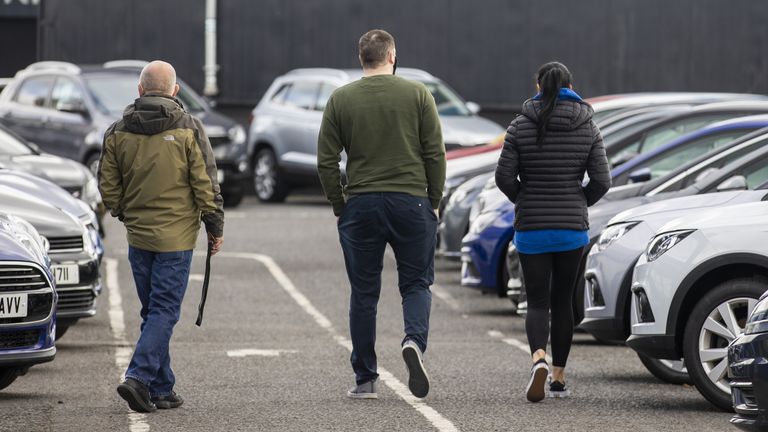A shortage of new models has helped drive a near-record leap in sales of used cars, according to industry figures, despite evidence of surging prices.
The Society of Motor Manufacturers and Traders (SMMT) reported that 2,167,504 vehicles changed hands during the second quarter of the year – up 6.6% on 2019 pre-pandemic levels.
The body said it was the best April to June performance on record and almost the best quarter ever for the used car market.
It charted several reasons for the performance including post-lockdown pent-up demand – with sales rising by more than 300% in April alone compared to the same month the previous year as showrooms re-opened and personal sales got back in gear.
Image: Sales of plug-in vehicles are rising for both the new and used car markets but second-hand availability remains lowIt said that petrol and diesel models accounted for more than 96% of the used vehicles sold – with just 1.3% of the total being plug-in cars.
AdvertisementHowever, The SMMT said that battery electric and hybrid model sales more than tripled over the quarter to 10,903 and 16,202 respectively as newer second-hand vehicles became available in the market.
An acceleration in low or no emission vehicle sales is unlikely in the coming months as new car sales are impacted by weak supply – a consequence of the shortage of semiconductor chips which has hit production globally.
More from Business Bringing in army ‘will not scratch the surface’ of HGV driver shortage Retail sales grow but remain below pre-pandemic levels Universities not returning to face-to-face teaching should not charge full fees, education secretary Gavin Williamson says Ryan Reynolds on Wrexham football club takeover with Rob McElhenney: ‘I wouldn’t dare call it soccer. I care about my well-being too much’ Greensill: David Cameron’s spokesperson says he ‘acted in good faith’ and denies reports alleging he earned £7m before firm’s collapse COVID-19: Vaccine pioneer BioNTech reverses its financial fortunes after shipping more than a billion doses ‘A code red for humanity’: Landmark climate report says global warming limit to be hit within 20 yea
The industry says its efforts to boost output have also been damaged by the so-called ‘pingdemic’ – demands to self-isolate via the NHS COVID app – leaving factories short of key staff.
Last month was the weakest July for new car sales since 1998.
SMMT figures released earlier this month showed that just 123,296 new cars were registered in the UK during July – a fall of almost 30% on the same month last year.
The grim prediction for UK car production this yearIts chief executive, Mike Hawes, said of the new figures: “This is welcome news for the used car market as transactions rebounded following nationwide lockdowns which closed retailers.
“More motorists are turning to used cars as supply shortages continue to affect the new car market, and the increased need for personal mobility with people remaining wary of public transport as they return to work.
“A buoyant used car market is necessary to maintain strong residual values which, in turn, supports new car transactions.
“We now need to see a similar rebound in new car sales to accelerate the fleet renewal necessary to deliver immediate and continuous improvements in air quality and carbon emissions.”
Data from Auto Trader, the private sales site, revealed some second hand models had seen their value leap by almost a third over the 12 months to June in the second quarter.
The Audi RS3 led the way with an average asking price of £37,507 – up by 31%.
It even found that a 12 month-old Land Rover Defender was currently priced around £13,500 higher than a new model.
Auto Trader’s commercial director, Ian Plummer, predicted that eight million used cars would be sold this year – aided by a backlog in young drivers looking to buy their first motors.
“This demand has sent used prices rocketing, up from an already significant 7.1% year-on-year increase in April to 11.1% in June.
“This steep trajectory has continued, and as of July, prices are tracking at over 14%.”
